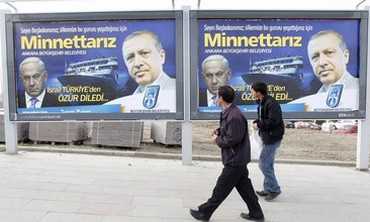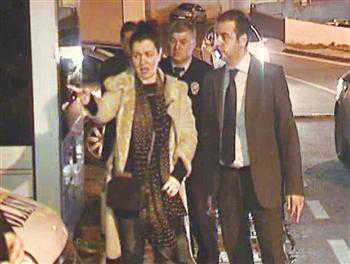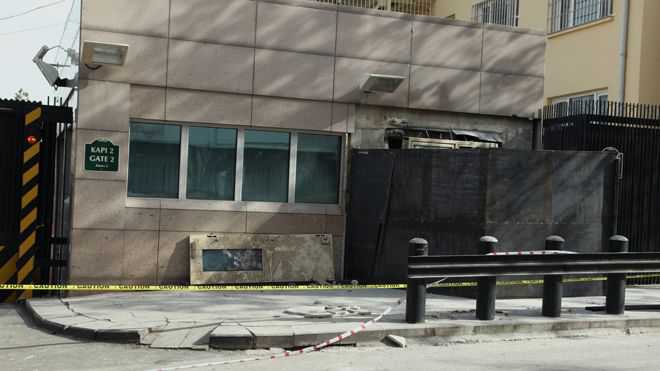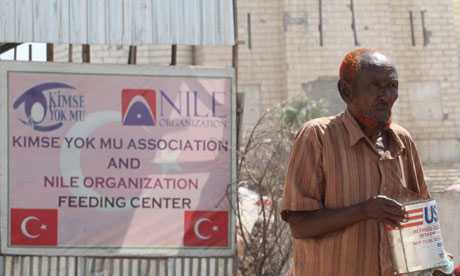Turkey will not alter its hawkish stance, yet Israel needs Turkey as a strategic partner. But not at any price.

Billboards put up in Ankara to thank Erdogan for getting Israel to apologize for Marmara incident. Photo: REUTERS/Umit Bektas
For many years, the relationship between Israel and Turkey has been extremely good. The close cooperation between the countries has been reflected in diplomatic relations, tourism, military cooperation and security, including joint military maneuvers and extensive defense trade.
Behind the scenes, there has also been cooperation in the intelligence field. However, Operation Cast Lead brought about a dramatic change.
Immediately thereafter, relations began to deteriorate as a result of initiatives carried out by Turkey’s leadership, supposedly in response to Israeli violence against Palestinians. In reality, however, it was only an excuse Turkey used to cover up its aspiration to become an influential player in the Muslim world.
Turkey’s Prime Minister Recep Tayyip Erdogan gradually began taking more and more extreme positions and speaking out strongly against Israeli policy. The peak came when the Mavi Marmara flotilla attempted to enter Israeli waters and the IDF used force to stop it. Turkey recalled its ambassador, diplomatic ties were cut off and joint military training was canceled. There was a total disconnect between the countries.
Erdogan needed to cut ties with Israel, and to weaken Turkey’s secular military, so that he could strengthen his position in the eyes of his Muslim constituents. He was also interested in positioning Turkey as a regional leader. To do so, Turkey had to constantly become more radical to keep up with Iran and Syria. Turkey’s demand that Israel apologize for the Marmara incident, and Israel’s refusal to do so, was the excuse Erdogan used to become even more extreme.
There are a number of ramifications to the cutting off of security cooperation between Turkey and Israel.
The defense industry took the hardest hit. Israeli exports to Turkey, including potential orders which were canceled as a result of the crisis, reached hundreds of millions of dollars. And the commercial relationship Israel had with Turkey was not limited to defense. Commercial, nonmilitary cooperation was also seriously hit. Numerous projects, including upgrading Turkish tanks in Israel, were canceled. Sensitive technological systems that had previously been sold to Turkey were exported in much smaller quantities. Large Israeli companies such as Elbit Systems, ELTA Systems, Elbit Systems Electro-optics – Elop and Israel Aerospace Industries were hit the hardest.
The IDF’s operational readiness was also affected.
Throughout the years, the IDF had benefitted from joint sea, land and air exercises with the Turkish military. In addition, they jointly planned operations that were carried out in distant locations, strengthened cooperation with NATO countries and practiced scenarios that could only be carried out with Turkish assistance.
The rupture led to an end to joint maneuvers for which the IDF had no suitable alternative.
The third area that was affected was intelligence.
Valuable security information regarding technology and intelligence had been transferred between the two countries over the years. This trade of information was the basis for the trust that had been forged. To a large extent, this was a prerequisite for Israel to achieve its goals. As relations with Turkey deteriorated, however, the fear that sensitive security information might find its way to hostile or even enemy countries grew. Security agreements were canceled and the alienation intensified.
Non-military commercial and legal interests were also hit. Following the cut in relations, there was a steep fall in the number of Israeli tourists who visited Turkey. Numerous lawsuits were submitted in Turkey against Israeli individuals and senior officers, which limited their movement outside Israel.
In recent months, there has been a change in the Turkish leadership. Erdogan realized that if Turkey wishes to be considered a regional power bridging East and West, and to remain on good terms with the US, then it would need to be more moderate.
At the same time, Syria, Turkey’s neighbor to the south, is falling into chaos, which could put Turkey in danger. Therefore, Erdogan has softened his tone and the atmosphere has become more relaxed. Turkey’s goals have not changed, and it is still maneuvering in an effort to gain status and power in the regional Arab leadership.
However, its need to remain close to the US and Europe requires that it watch its step.
The Turks received the apology they asked for, and the ambassadors will probably be reinstated. Smiles may replace the angry faces, and defense cooperation might even return to some extent. But the trend has not really changed. Turkey must continue to walk on the thin line between its desire to lead the predominately Muslim Middle East, and its need to please the West and retain its image as a moderate country.
We in Israel are sitting right on that thin line. Apologies like the one Netanyahu gave Erdogan are apparently necessary to keep the thin line from breaking. But the future holds many more difficulties in the relationship between the two countries. Turkey will not alter its hawkish stance, yet Israel needs Turkey as a strategic partner. But not at any price.
The writer is a former brigadier-general who served as a division head in the Shin Bet (Israel Security Agency). The original article appeared in Hebrew in Sof Hashavua.
Translated by Hannah Hochner.
via Are Israel and Turkey friends again? | JPost | Israel News.





